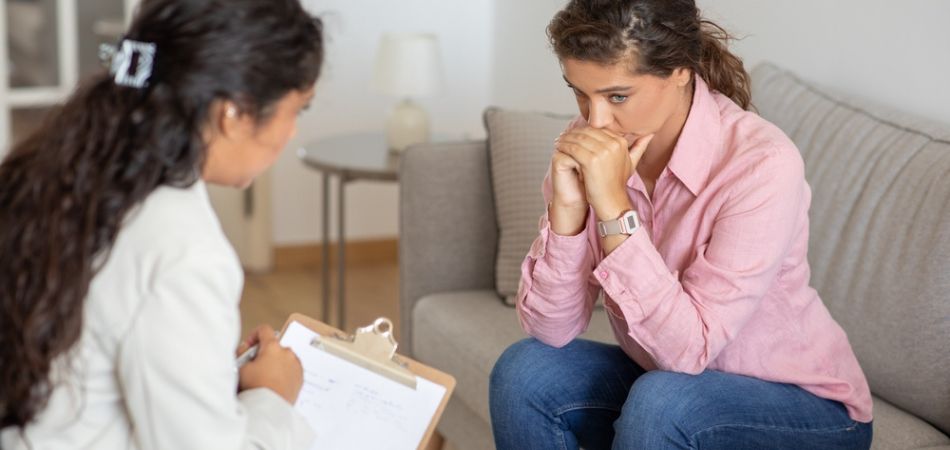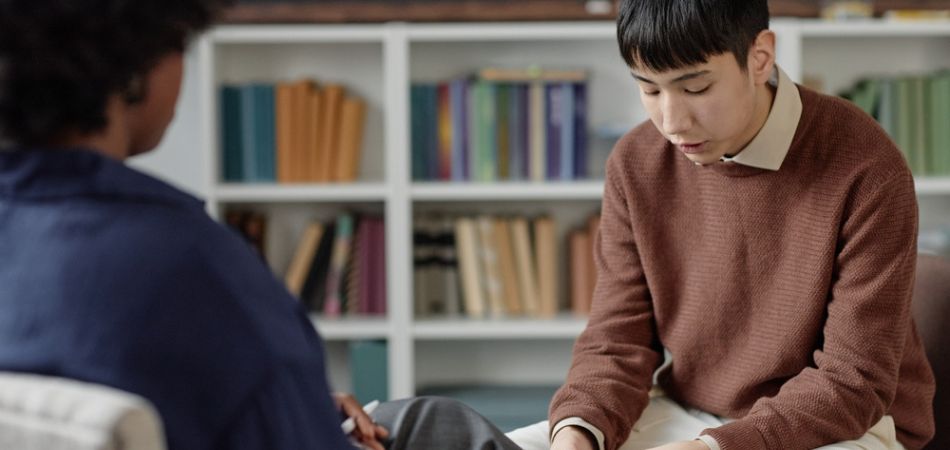Last Updated:
September 18th, 2025

There’s something terrifying about the idea of sitting across from someone you don’t know and baring the parts of yourself you’ve kept hidden. Your mind races to question this person: “How can a stranger possibly understand what I’ve been through?”
Yet therapy does not need to involve mental conflict. It can become a sacred oasis for the healing you need, letting your truth unfold at your own pace.
What is therapy in addiction treatment?
In an addiction treatment programme, therapy is used in conjunction with medical detox and aftercare, with the objective of bringing you to sustained, complete recovery. Therapy functions as a structured, evidence-based lifeline that helps you make sense of, and come to terms with, your mind, body and spirit.
At its core, addiction therapy helps you understand why substances become a coping mechanism in the first place, and how that substance carried you into addiction’s dark embrace. It uncovers the pain lying dormant beneath the addiction and the patterns that keep pulling you back in.
No two therapy processes are identical, but the goals of addiction therapy remain consistent: to help you develop healthier responses to stress and rebuild a life that doesn’t rely on drugs or alcohol to feel manageable.
While we understand that a person can find therapy in many different ways, like a conversation with a friend, exercise, or prayer, therapy for addiction treatment is more straightforward. It utilises experts qualified in the fields of psychology and psychiatry.
Every instance when we meet someone for the first time, our mind registers a stranger, and a first meeting with a therapist is no different. Yet, a therapist already understands this and does everything within their power to help you relax, open up, then start the process of deep healing.
Why does it feel so hard to open up to a stranger?
Metaphorically speaking, therapy can become the key to the doors that hold you back from becoming the person you want to be. Therefore, meeting the holder of this key, the enabler of your development, can be a daunting process, filled with the most sceptical of questions:
“How can this person who knows nothing about me transform me into someone stronger?”
“What makes this person any different from a stranger I meet on a park bench?”
“How do I know that someone else’s healing through therapy would work for me?”
Meeting uncertainty with a degree of caution is one of the most natural things in the world. Our ancestors used it when meeting people from outside their village. Yet one way we may differ from our ancestors’ scenario is that we are not meeting a stranger who may be dangerous. We are meeting someone with credentials, who has a history of helping people overcome their most troubling inner thoughts.
A good therapist understands the burden you carry, and can help with the weight of trauma, regrets and past failures. They can do so in two ways: by making the burden lighter, and by increasing your strength, as you march forward toward recovery.
What makes a therapist different from anyone else?
In many ways, a person can find therapy in a multitude of far-reaching activities. Some people can listen to their favourite musician and experience healing. Others find solace in writing to a childhood pen pal. Both scenarios involve receiving a form of therapeutic release. But a therapist’s role is different, in that they are trained to listen, absorb your circumstances, then finally set you on the path of true healing.
In addiction therapy, your words are not just heard. They are held, examined and met with professional insight and care. Unlike talking to someone in your life who might interrupt or steer the conversation, a therapist stays in your world.
They’re with you as you take steps into your most profound memories, thoughts and experiences. They remain steadfast even at your most fragile times, without forcing you to reveal anything before you’re ready.
Can opening up to a therapist really change me?
It is natural to have apprehensions about whether opening up to a therapist will work for you. You might see it as just another box that gets checked on the recovery support checklist. After all, you’ve probably tried opening up to other people before, and been met with confusion or outright hostility.
Yet, professional therapists see people all the time who are living a life worse than yours. That is not to diminish the difficulty of your situation, but to help you remember that almost always, there is someone worse off than you.
From this foundation, change becomes sustainable. Painful experiences are brought into the open and met with empathy. A therapist helps you view trauma or painful experiences in a more objective way. They help you to reframe the context of your addiction drivers, so that you can objectively battle their toxic influence.
Opening up can become the first step in writing your new story, where tomorrow’s pain dissolves and becomes the fuel for positive changes, moving forward.
What are the different types of therapy for addiction treatment?
Addiction treatment doesn’t rely on just one therapeutic model. Every person’s history and objectives are different, so a variety of therapies are offered, each with its own tools for healing.
Here’s a brief breakdown of the characteristics of each modality:
There are other powerful modalities of therapy used in addiction recovery, such as “Motivational interviewing” (MI) and “acceptance and commitment therapy” (ACT). Learning about each form can help you choose the right path to lifelong recovery.
Tips for making therapy work for you
If you’re making the brave decision of entering therapy, there are some useful steps to maximise your healing and create the most stable footing for complete addiction recovery:
- Don’t pressure yourself to share everything right away: Don’t open your deepest wounds on day one. Healing isn’t set to a schedule, so allow trust to develop over time.
- Let your therapist know what you need from the process: Be direct in letting your therapist know what your goals are. Therapists can help you develop them, too, but they will appreciate your honesty and ability to aim for goals.
- Remember that discomfort in the beginning is normal: It’s okay to feel unsure or even resistant at first. These feelings don’t mean therapy isn’t working; they often mean something important is being opened.
- Be open about when you’re not ready, or when something feels off: If the pace feels too fast or a topic feels too raw, you can say so. Your needs have the power to shape the therapy. It does not always need to be the other way round, where you are shaped.
Where can I find someone to talk to about my addiction?
If you’ve been holding your pain in for a long time, the thought of opening up to a stranger might still feel impossible. But you don’t have to do it alone, and you certainly don’t have to do it all at once.
At UKAT, we know how powerful it can be to feel seen and heard, especially when addiction has made you feel invisible. Our experienced therapists offer a safe, non-judgemental space where you can speak freely and start to process what’s really going on beneath the surface. We’re here for you at every stage.
When you’re ready to talk, we’re ready to listen. Reach out today and take that first brave step toward healing.




